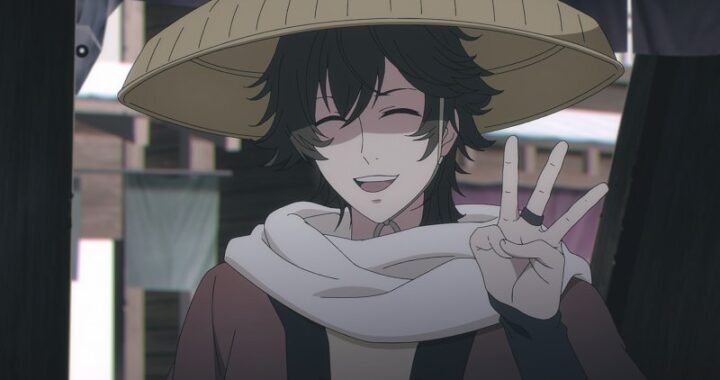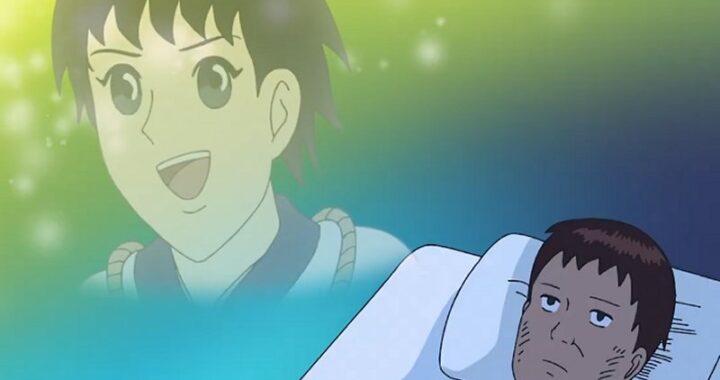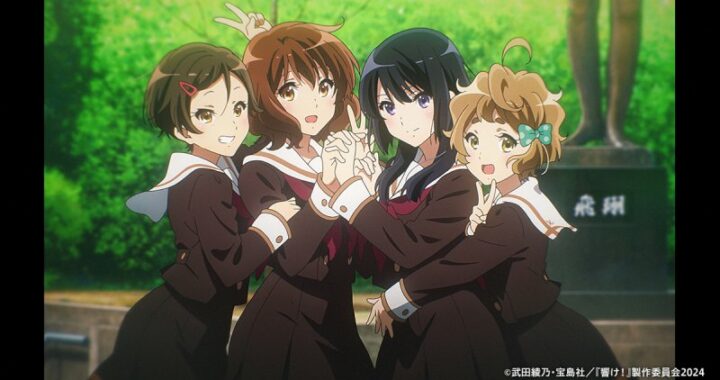
What They Say:
One day, Yukiteru discovers that his cell phone “diary” can now tell him the events of the future. The problem is, eleven others also have similar diaries, and only one can win this Survival Game. The winner becomes a god. The losers: DEAD END.
The Review:
Audio:
The audio presentation for this release is pretty straightforward but nicely done as we get the original Japanese language in stereo encoded at 192kbps while the English language track is done in 5.1 at 448kbps. The series is one that has a good mix of action and dialogue to it that allows it to blend well while not standing out as a strong release in some ways. The show has a lot going on throughout it with different kinds of action happening, from chases to gun fights, explosions and more, but it’s not one that goes big with what it does. It’s all very capable and appropriate but it doesn’t stand out when it comes across. Dialogue is similar in that there’s a good mix of styles to it overall but mostly it just has a center channel kind of approach to it where it has some minor placement but not much that you’d notice based on the way it unfolds. But similar to the action, it’s done well and without problems and we had no issues with dropouts or distortions during regular playback.
Video:
Originally airing in 2011, the transfer for this TV series is presented in its original aspect ratio of 1.78:1 and is enhanced for anamorphic playback. Animated by Asread, we get thirteen episodes with this collection where there are seven on the first and six on the second. The show has a slightly darker and earthy tone to it at times, which is interesting since it’s mostly in a city setting for a lot of it, but it also has some brighter and more striking sequences which stand out all the more because of it. The general look of the show is good as it handles detail well, colors are mostly solid and there aren’t any significant or really noticeable areas of issue. There are a few areas where gradients are more noticeable and some of the problematic colors show more noise than I’d care for, such as the darker reds and some of the gray color areas, but mostly it’s a decent transfer with no big issues to deal with.
Packaging:
The second half of the series gets just a standard keepcase for it with an O-card that mirrors what we got with the first half. The main keepcase is pretty nice with some illustration artwork of the core cast and new additions for this half that has a good intensity to it. The colors are striking even if subdued and the line work is fantastic. The back cover is traditional with more artwork and shots from the show along with a breakdown of the premise and the extras to be had on the release. The cover is fully reversible where each side has more illustration artwork that really is strong looking and the back of it just breaks down the episodes by number and title. No show related inserts are included with this release.
Menu:
The menu design for this release is kind of sparse in some ways but works decently enough for the show. The general design has a black and white split where the left third is white with the navigation angled downward which is hard to read. The rest of it is black and has the character artwork on it, such as the first volume where it has Yukki, Yuno and Sixth together. The dark background feels like too much with it all but it’s not striking in a bad way. Submenus are easy to navigate and set up, even with the text sideways, and language setup a breeze as it defaults to English with sign/song subtitles.
Extras:
The extras for this release are pretty good and English language fans make out well as we get a couple of new episode commentaries for the series. These continue to be fun for fans since they bring in the cast and production team to talk about it, their experiences on it and some of the silly things that go on in the show itself. We get a fun little omake/bonus episode as well which is short and to the point with its fun that’s similar to what we got with the previous volume and we also get more promotional videos as well as the new clean opening and closing sequences.
Content: (please note that content portions of a review may contain spoilers)
The first half of Future Diary was certainly interesting in a lot of ways as it unfolded and revealed itself with the kind of game that Deus was running in order to choose his successor before his time was over. While the premise moved in relatively straightforward ways in the first half with what it did, it also took some interesting and less than interesting turns. Yukki’s weak nature is all too common and easily used which made him pretty easy to ignore. Yuno’s hyper violence when it surfaced was surprising and almost shocking with what it did, particularly when they dealt with the cult and its members. But as it moved forward, we got some great bits of humanity, such as the detective, and a greater exploration of the various Diary owners as there are more about them than has been exposed so far, making some of them more sympathetic than you’d expect.
With the second half, Future Diary manages to be just as engaging and has some nice twists to it that really makes you become truly intrigued by it, if they can pull off what they’re doing. So much of what really started driving events towards the end of the first half was how Yuno insisted that Yukki place all of his faith in her and that they would survive until the end in order to set Yukki up right. It’s disconcerting even if she is madly in love with him as we haven’t seen what could really make her feel that way. Along the way, with those they encountered and the situations that they had found themselves in, a smaller group with Akise as a key member was forged to try and step outside of the controlling nature of Deus, which meant adjusting their phones and how they work in order to avoid being constantly monitored.
That gave everyone more freedom, but the show also threw some more twists at the cast in order to screw them over more. The growing distrust of others towards Yuno is a big part of things, but what sends it all off the rails is that as it goes on, Yukki’s parents are taken out of the picture and that turns him from a weak character to one that now truly feels like he has to win the game in order to become Deus and bring them back. Whether that’s possible or not is never really explored early on, but it’s what Yuno uses in order to control and turn him into a proper weapon to take down the other Diary users. It’s a quick snap in personality for Yukki at this point and he turns into a decent to solid strategist. A lot of this is achieved through some smart use of his phone and its abilities as he realizes the amount of information he can gain just by sitting in the very technology savvy city hall, which clues him in to the movements of so many people while also revealing the truth that the mayor is one of the more dangerous diary users out there that’s organizing to take all of them out.
With an opponent at hand, it turns into a series of back and forths that work well as the two sides go at it and each of them adds more to their movement from the other surviving diary users that are looking for a way to survive. The back and forth is fun since it gives us a pairing of Yukki and Yuno that’s aggressive and that’s very unlike the first half of the series. He’s too competent in a lot of ways, but with the foreknowledge that he has, it makes sense to a degree. And with the certainty of purpose since it’s all about winning in order to bring his parents back to life, he’s properly motivated. But it’s also clear that he’s not entirely trusting of Yuno since she’s simply way too good at this and her level of violence is above and beyond what the others are like in the game, even if eliminating opponents is all part of it.
Future Diary does have a significant twist to it, one that is revealed earlier as we see more of Yuno’s past finally come to light. This area is definitely something that I found very appealing as we learn how she’s from a separate cycle that managed to slide over into this one to correct her mistakes while sticking to her central goal of being with Yukki. Her mind has certainly splintered in some expected ways based on what she’s experienced, and with some really good flashback moments shown that clears up how she made it here and what she did to survive, you can feel some sympathy for her but also realize that she lost a lot of her humanity, so much that she can’t even treat this cycle as really existing in a way. Everything is unreal and simple in her world which allows her to be brutal, because in a sense it’s not real. And she can simply reboot everything in the end and try again. There are some other twists along the way, some involving Murmur which didn’t surprise me since you knew she was going to be setup for something in this half, and it all moves well towards a rather surprisingly satisfying ending, even if it does end with a glimmer of hope instead of something crueler and more honest as it started out as.
In Summary:
Future Diary spends some of its time reveling in the violence, but it’s violence borne from a broken mind that’s attempting to find a way to fix things no matter the cost. The relationship between Yuno and Yukki is key to things here and understanding Yuno is probably the most important thing. Events here go big and violent across the board as more characters introduced, others resurface and some really interesting dream bits come about as well that shows you what could be. The series is one that worked for me a lot of the time, but not all of the time, as it worked with some great concepts but had a hard time with execution at times. Part of it feels as though it’s too long, but a single season show would have been too tight and difficult to work with. As a whole, Future Diary is definitely a very interesting and engaging experience that doesn’t pull its punches and really puts its characters through the wringer, which makes it worth spending time with.
Features:
Japanese 2.0 Language, English 5.1 Language, English Subtitles, Select Episode Commentaries, Textless Opening and Ending, Trailers, Bonus “Omake” Short.
Content Grade: B
Audio Grade: B+
Video Grade: B+
Packaging Grade: B-
Menu Grade: B
Extras Grade: B+
Released By: FUNimation
Release Date: September 17th, 2013
MSRP: $59.98
Running Time: 325 Minutes
Video Encoding: 480i/p MPEG-2
Aspect Ratio: 1.78:1 Anamorphic Widescreen
Review Equipment:
Sony KDL70R550A 70″ LED 1080P HDTV, Sony PlayStation 3 via HDMI set to 1080p, Onkyo TX-SR605 Receiver and Panasonic SB-TP20S Multi-Channel Speaker System With 100-Watt Subwoofer.





That’s a fair review and I can agree with it.